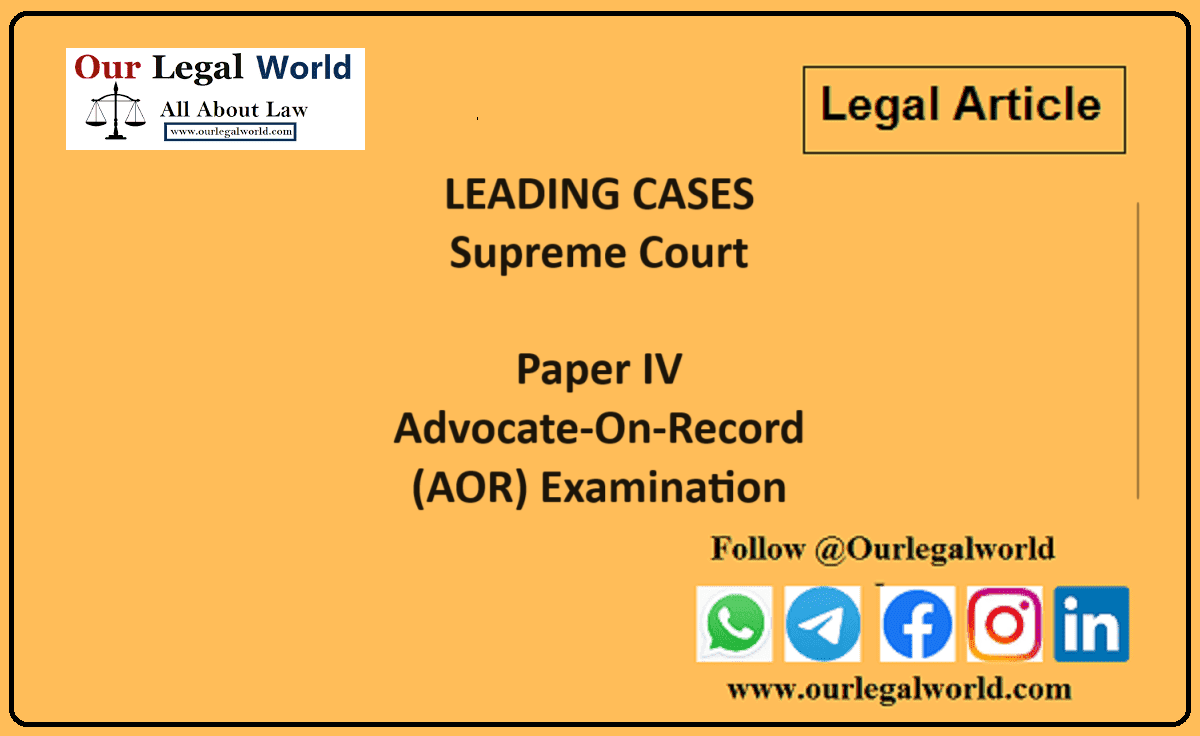DIVORCE BY MUTUAL CONSENT AND CASE LAWS
INTRODUCTION:
The concept of divorce by mutual consent is incorporated under Sec. 13B of the Hindu Marriage Act, 1955 and under Sec.28 of the Special Marriage Act, 1954. Any party who seeks divorce by way of mutual consent will have to prove that they have been living separately for at least one year immediately preceding the year of filing the application for divorce.
The couple who wishes to get a divorce by way of mutual consent will have to prove that there is no scope of reconciliation and they do not wish to perform any marital obligation, mere physical separation would not be sufficient for getting a divorce by mutual consent. Secondly, it is also important to see whether the consent given by both the parties is free or no, and if within six months of giving the consent, either or both the parties do not withdraw it, then within 18 months of filing the application for divorce by mutual consent the competent Court may procced by granting the divorce decree.
The main purpose of providing a gap of six months is to give an opportunity to the couple to rethink on their decision and thus, this period is called as ‘Cooling Period’.
However, there are various instances where the Court has washed off the criteria of the cooling period, with a view to reducing the hardships caused to the couple.
CASE LAWS ON DIVORCE BY MUTUAL CONSENT:
Vanamala v Shri. H.M Ranganatha Bhatta[1]: In this case, the Apex Court held that a woman is entitled to maintenance under section 125 (4) of the Code even if the divorce was obtained by mutual consent.
Sureshta Devi v Om Prakash[2]: The apex court was of the view that the divorce petition can be withdrawn unilaterally. Basically, it stated that if one of the parties subsequently withdraws its consent within the allotted time, the Court shall not be entitled to pass a divorce decree by mutual consent. The Court stated that ‘if the decree is solely based on the initial petition, it negates the whole idea of mutuality and consent for divorce. Mutual consent to divorce is the sine qua non for passing a decree for divorce under Section 13-B. Mutual consent should continue till the divorce decree is passed.’
Anjana Kishore v Puneet Kishore[3]:It was stated in this case that, the Apex Court is entitled to waive off the cooling period by virtue of its functional powers conferred on it by Article 142 of the Constitution.
Anil Kumar Jain v Maya Jain[4]: The Supreme Court held that it was necessary that the consent given by the parties for acquiring divorce by mutual consent should subsist till the second stage of petition comes up and subsequently a decree of divorce is passed. It further stated that it is only the Apex court who is entitled by virtue of Article 142 of the Constitution to use its extraordinary powers with a view to waive off the cooling period in special circumstances. And in any other normal circumstance, the provisions of the statue are to be considered.
Suman v Surendra Kumar[5]: In this case, the Rajasthan High Court answered the question, whether silence would amount to a tantamount withdrawal of consent. The Court stated that when the matter is left for inference at the will of one part, then the inference must be drawn in favor of the consent rather than for absence of consent. Thus, it was held that mere silence cannot be taken as withdrawal as consent.
Amardeep Singh versus Harveen Kaur[6]: It was held in this case that six months period that is mentioned in section 13B(2) is directory in nature and not mandatory. Also, this is open to the Court to waive off the cooling period if it decides to depend upon the facts and circumstances of the case that there is no scope of reconciliation left between the couple and there are chances of alternative rehabilitation. The Court stated that the object of the provision is to allow the parties to dissolve a marriage by mutual consent if the said marriage has irretrievably broken down. And the mere intention of providing a cooling period was to safeguard the institution of marriage against a hurried decision if there was otherwise a scope of reconciliation.
Also Read: ESSENTIAL CONDITIONS OF VALID MARRIAGE
Laxmibai Ward v Shri Pramod[7]: It was held in this case that an appeal is maintainable against a decree of divorce by mutual consent. It states that Section 28(1) of the Hindu Marriage Act, provides a right to appeal and it further states that all original decrees made by the Trial Court under the said Act are appealable. The Court also classified that appeals under section 96 of Civil Procedure Code are on different footings and the bar that has been put up under Section 96 (3) against appealing in case of the consent decree is not applicable in this context. The Court also clarified that divorce by mutual consent is not entirely based on mutuality of the consenting party alone and there is involvement of the Court in the decision making. Thus, the possibility of an error, be it legal or factual cannot be ruled out and therefore an appeal under section 28 has to be approved in divorce decree by mutual consent.
The above-mentioned case laws try to clear the concept of divorce by mutual consent by highlighting all the major aspects of a divorce decree.
References-
[1] 1995 SCC (5) 299, JT 1995 (5) 670
[2] 1992 AIR 1904, 1991 SCR (1) 274
[3] (2002) 10 SCC 194
[4] (2009)10 SCC 415
[5] AIR 2003 Raj 155.
[6] Appeal (Civil), 11158 of 2017
[7] Second Appeal No. 40 Of 2009








![Tax Law Internship at Legum Attorney [Chamber of Ashish Panday], Delhi : Apply by 15th May 2025](https://www.ourlegalworld.com/wp-content/uploads/2025/05/IMG_0113-min.png)
